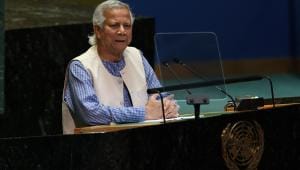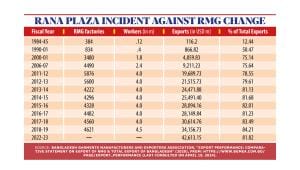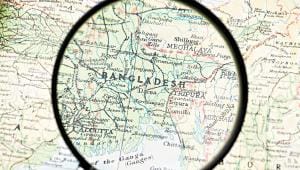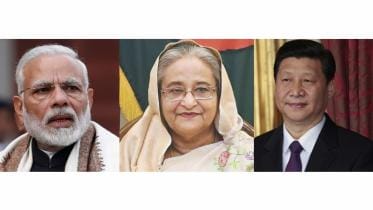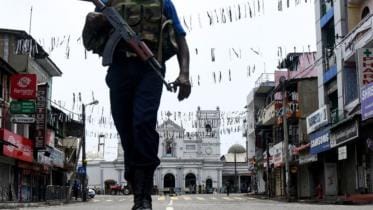The colour of war?
Today’s Red Sea skirmishes raise multifaceted concerns, which range from the war in Gaza widening and awakening old wounds, to geopolitical frontlines being rewritten by shifting chokepoints.
13 February 2024, 00:00 AM
Bangladesh as a ‘developed country’: ‘Graduating’ imperatives
“Graduation” has become a Bangladeshi buzzword. Journalists, scholars, and technocrats were working on that term even before November 24, 2021. On that day, the United Nations (UN) General Assembly green-signalled a possible exit from the “least developed country” (LDC) to join the “developing” list from 2026.
12 February 2022, 18:00 PM
9/11 anniversary, Afghanistan and values
“What goes around comes around” may be an apt and oft-used cliché, but in referencing 9/11 and Afghanistan, it only embitters. US President Joe Biden’s withdrawal from “forever wars” was supported by 54 percent of US adults, according to a September 4 Pew survey.
11 September 2021, 18:00 PM
Afghanistan, Taliban and the United States
Full US troop withdrawal from Afghanistan was announced by President Joe Biden on April 14, 2021. It raised eyebrows but did not ruffle public feathers.
21 August 2021, 18:00 PM
Branding Bangladesh: The ‘identity’ challenge
Identity matters. It matters most amid flux, which the 21st Century is riddled with. Compromising the past and adding “new” components always knock on identity doors. Distinguishing the non-negotiable identity components from the negotiable gives us a head start.
18 February 2021, 18:00 PM
The inclusivity paradox of the digital age
Behind every “age”, as if by definition, lies a spark. Ironically, although the “digital age” may be the most profound of them all, as deducible from its own so-called “digital revolution”, its time-span is too fluid and that “revolution” is more revolutionary linguistically than it is on the ground.
17 February 2020, 18:00 PM
Asia’s balancer, Bangladesh
Remember those expansive aphorisms, “Britannia rules the waves” and the “empire where the sun never sets”?
6 December 2019, 18:00 PM
Oscillating Anglo-American relations
A rolling stone, as the cliché goes, gathers no moss. According to musician Robert Zimmerman, it is “like a complete unknown,” indeed, “with no direction home.” Under his more popular identity, Bob Dylan, he penned “Like a rolling stone,” often regarded the crème de la crème song in its genre. It might also be the swansong of a fabled bilateral relationship. Gone awry, that relationship arguably symbolises the upended global status of two partners.
28 July 2019, 18:00 PM
A Giant Retreat for Mankind
Remember those first words ever spoken from the moon? In the half-century since Neil Armstrong uttered them, the space race has invited many other countries—from the rich to the poor, from the developed to the developing—and even attracted private-sector
19 July 2019, 18:00 PM
‘Clash of civilisation’ or crash: Environmental doomsday?
What do the following civilisations have in common: Mesopotamia four millennia ago; the 8th-century Viking Greenland settlement; Mayas from the 10th century; and the Khmer empire in the 15th century?
9 June 2019, 18:00 PM
Angela Merkel’s legacy: ‘Holy Roman Empress’?
Historians are often bemused by how the millennia-old Holy Roman Emperor was not holy, nor Roman, nor even an emperor.
2 June 2019, 18:00 PM
GPA and beyond: Time to break out of old pedagogical models
Grumpy” was her name. In the flower-filled month of May, the world’s most famous cat of the same name bid her ever-cheering audience a sad adieu. Perhaps not the best of analogies, but it highlights grumpiness in another area, that, fortunately, we can do something about.
28 May 2019, 18:00 PM
Galloping Bangladesh: Emperor with no clothes?
Don’t judge a book by its cover.” So goes a popular cliché, though appraisals become more sanguine the more one opens the volume. Recent (April) reports about the country’s top-flight economic growth-rates expose why heeding that message helps keep us on track.
17 May 2019, 18:00 PM
There goes the neighbourhood: Sri Lankan spillovers
"Tragedy” only mildly describes Sri Lanka’s bombing spate. It was heinous, stirring the wrong juices, pitting the wrong spiritual brethrens against each other. It was evil, not only fanning flames between two religious groups...
3 May 2019, 18:00 PM
Of fires, fates and fortunes
Fire,” Don McLean wrote in “American Pie”, “is the devil's only friend.” It must have been so for Roman Emperor Nero: he anecdotally “fiddled while Rome burned” in 64 AD.
20 April 2019, 18:00 PM
'Civilising' Dhaka
Civil society cannot be built this way, upon the salacious preferences of home-builders, bus-drivers/conductors, and environment abusers.
5 April 2019, 18:00 PM
Crusading children: Fault in our stars... or ourselves?
At least two truisms can be said about children: every mother and father goes out of her/his way to build the best possible future for them; and the state does not have a choice but to follow suit.
30 March 2019, 18:00 PM
Post-Christchurch social reconstruction: Global the message, local the onus
It is not enough to alert the public of social cracks: how they can be repaired must be part and parcel of any de-constructing exercise.
23 March 2019, 18:00 PM
Christchurch and 'social cracks'
It was not, as Prime Minister Jacinda Ardern noted, “one of the darkest days,” in New Zealand's history, but “the darkest”. New Zealand
16 March 2019, 18:00 PM
Back to a future jungle?
Green is “the colour of nature and health,” according to Jacob Olesen, a Dane lover of colours.
14 September 2018, 18:00 PM







